You put a lot of effort into growing your email list, so it’s easy to fall into the trap of over-valuing your subscriber numbers. But what good does a high subscriber count do if your other numbers aren’t increasing?
Numbers like open rate… click-to-open ratio…ROI.
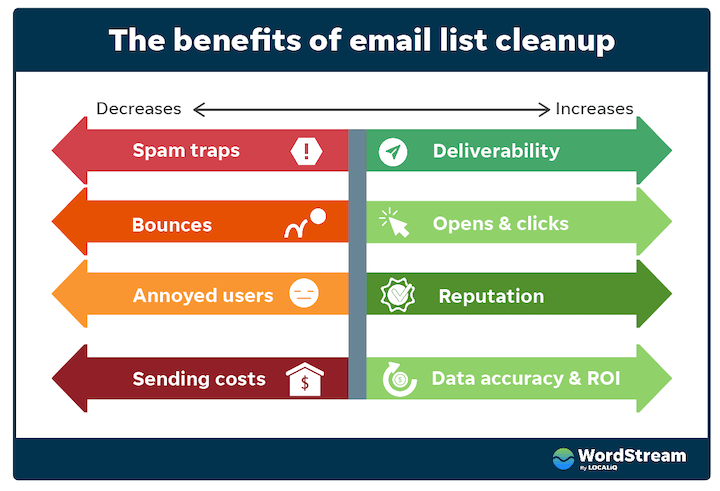
The fact of the matter is, email marketing is a great way to stay connected with your prospects and customers, but only if you’re reaching engaged, quality contacts who value your emails.
So in this post, we’re going to share 10 tips to help you declutter your email marketing list so you can get the results you want.
But first, let’s dive into why it’s so essential.
Why do I need to clean my email marketing list?
Running monthly email list cleanup is an email marketing best practice that helps you to drive better metrics, insights, and ROI. Here’s how:
- More meaningful communication. A clean email list is segmented according to your subscribers’ preferences, occupations, interests, etc, allowing you to deliver personalized communication with targeted messaging.
- Higher engagement. With more personalized communication, of course, comes higher open rates and click-to-open rates.
- Further optimization. The more engagement with your emails, the more granular insights you can gather about your subscribers from campaigns and A/B tests, like which content topics they prefer and which call to action phrases resonate best. This enables you to optimize the experience further and retain their long-term interest and loyalty.
- Stay out of spam filters. High bounce rates, spam complaints, and unsubscribes all indicate to email servers and filters that your business cannot be trusted. This means your emails will be flagged as spam, which is detrimental to your reputation and deliverability.
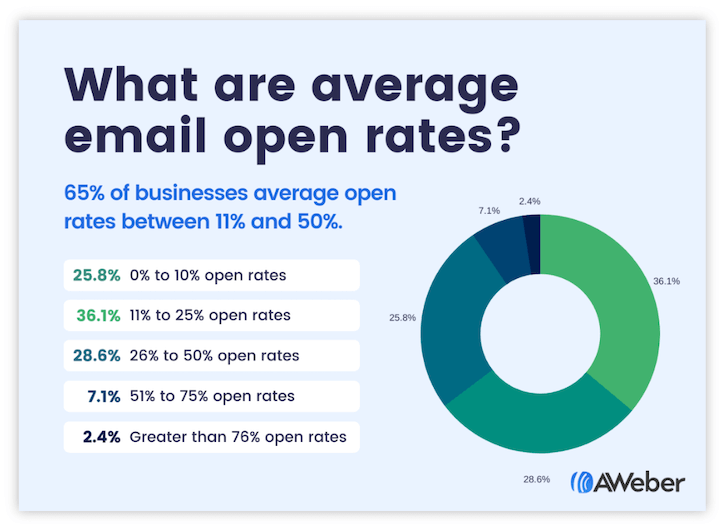
10 tips to declutter your email marketing list
According to Litmus, email drives an average ROI of $36 for every $1 spent. That’s higher than any other channel—but it’s not a guarantee. To achieve this goal and beyond, you need a clean, high-value email list. Here are nine email cleaning tips to help you secure a higher ROI.
1. Remove your hard-bounce emails
A hard bounce is an email that fails to reach the sender due to a permanent issue. This could be that the recipient’s email address is invalid or the domain has blocked email delivery.
Unlike a soft bounce (which is when the email is temporarily undeliverable) there’s no way of resolving hard bounce emails.
If spam filters and email servers think your hard bounce rates are too high, they’ll flag you as potential spam and block your IP address, harming your sender reputation and email deliverability. Always check your list for hard-bounce emails and delete them ASAP.
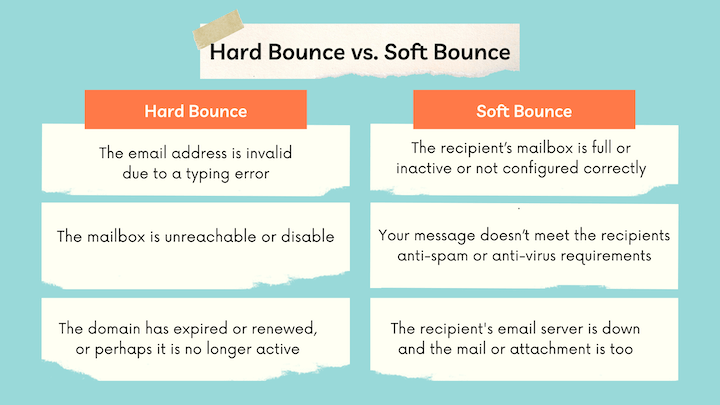
2. Delete duplicate emails
You may find—particularly if you import contacts—that some users are subscribed to your list multiple times. This is a big no-no, as these recipients will receive multiple copies of the same email.
Aside from sabotaging the accuracy of your campaign’s performance metrics, duplicate emails are often thrown straight into the spam folder. Their obtrusiveness can even lead users to unsubscribe completely.
3. Determine your inactive subscribers
Your email provider should be able to show you metrics for individual subscribers, such as their email open, click-through, and conversion rates. You can use this information to determine your inactive subscribers and target them with re-engagement campaigns (more on that in a minute).
Sometimes, though, it might be worth deleting inactive subscribers immediately. If a user has never engaged with your brand beyond their initial subscription—especially if it’s been a significant period of time —then it’s probably easier to just delete the address and move on.
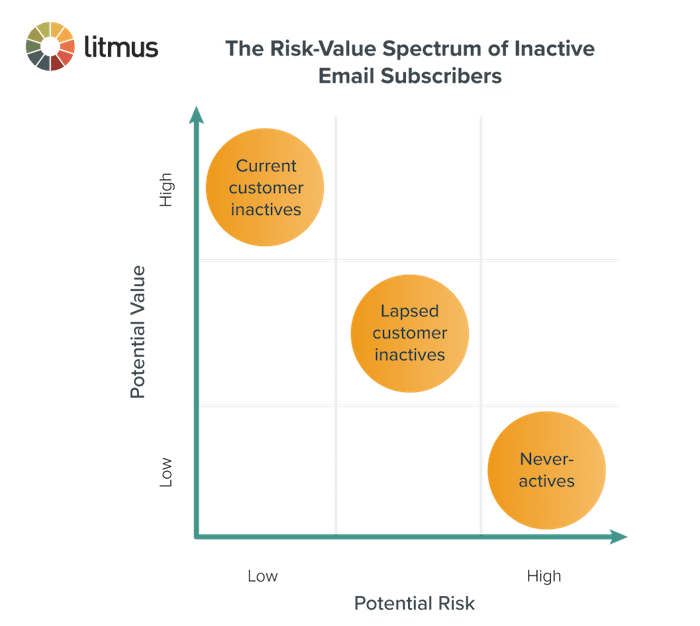
4. Visualize your ideal subscriber
Your ideal subscriber is the one who opens and engages with every single email. But who exactly are they?
By creating subscriber/customer personas, you can paint a clearer picture of your ideal subscriber and create hyper-targeted, personalized content. A subscriber persona is a semi-fictional characterization of your ideal subscriber, based on market research and data.
Subscriber personas also help you source higher-quality leads, which in turn results in a higher-quality email list. This means you can spend less time on rigorous monthly email cleaning and more time perfecting your email style guide and creating results-generating campaigns.
5. Use a proper list management software
Email automation software helps you manage your email lists more efficiently. Some of the popular tools include ActiveCampaign, Moosend, Mailchimp, and SendinBlue. Alongside your market research, they provide the information and tools you need to segment your email lists based on your subscribers’ interests, behavior, engagement, etc.
With list segmentation, you can create personalized and targeted email marketing campaigns that drive engagement and higher ROI.
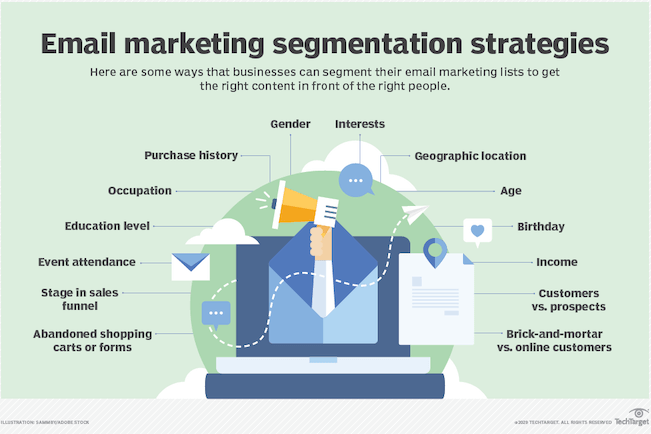
Other helpful features of email list management software include contact categorization and two-way data syncing between apps, both of which keep your lists orderly and updated.
It should also integrate with your other communication tools, such as your call center software and CRM. For example, you might create triggered emails that send immediately after someone interacts with your virtual receptionist service or chatbot.
6. Make it easy to unsubscribe
A difficult or long-winded unsubscription process can harm your business’ reputation. According to Qualtrics research, 33% of consumers will privately tell their friends about a bad experience. Approximately 15% will share their negative experiences on social media. Not good for your reputation.
Whether it’s because their interests have changed or they accidentally subscribed while making a purchase, sometimes users will want to unsubscribe. By providing them with an easy way to opt out, you can organically maintain good email hygiene while preserving your positive reputation.
A simple link in your email’s footer and a playful confirmation message usually does the job!
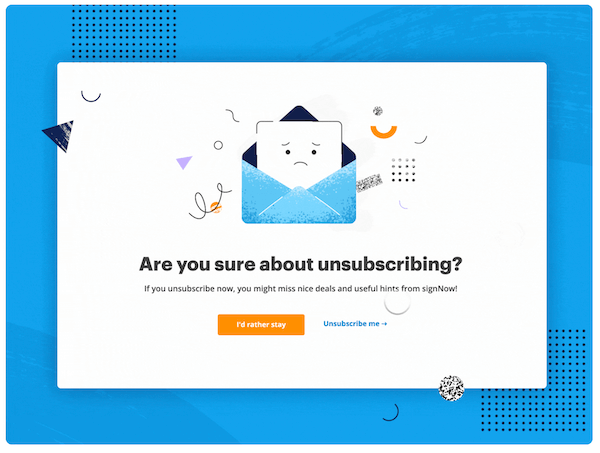
7. Run a re-engagement campaign for inactive customers
After you’ve identified all of your inactive users, you have three main options. The first, as we discussed earlier, is to simply delete the addresses from your list. The second is to target them with a re-engagement campaign.
Re-engagement campaigns specifically target inactive users with hyper-personalized, incentivizing offers. Discounts and vouchers are a popular go-to, but asking questions and showcasing new features are all ways that you can draw inactive subscribers back in.
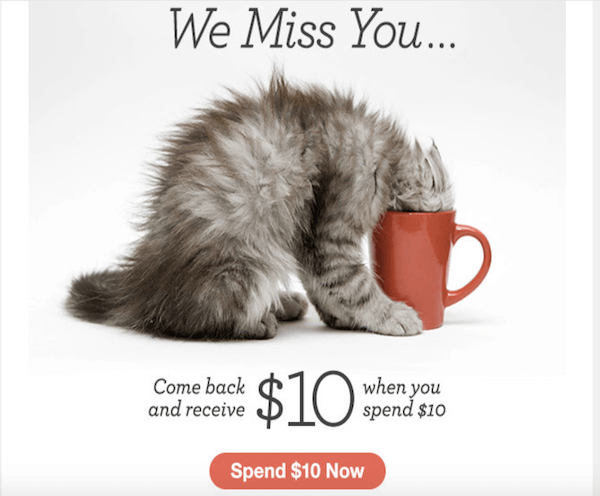
8. Locate inactive users and give them the option to opt-out
If you’re afraid of prematurely removing your inactive users, you could try reaching out to them with an opt-out email beforehand.
Opt-out emails will usually trigger one of three actions. Either the user will gracefully opt out of your emails (which results in less manual email cleaning for you); they won’t respond (which is a sure sign that their address should be deleted); or they’ll re-engage, especially if you throw in some humor and emotion.
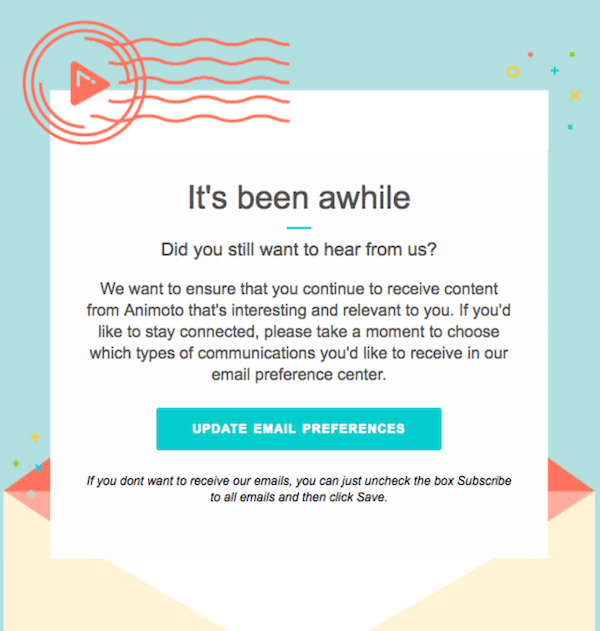
9. Try an opt-down option
You could also present your users with an email marketing strategy called the ‘opt-down’ option. Opting down simply means that users can customize both the type and frequency of the emails they receive. This customer-centric approach ensures that users only receive what they’re interested in.
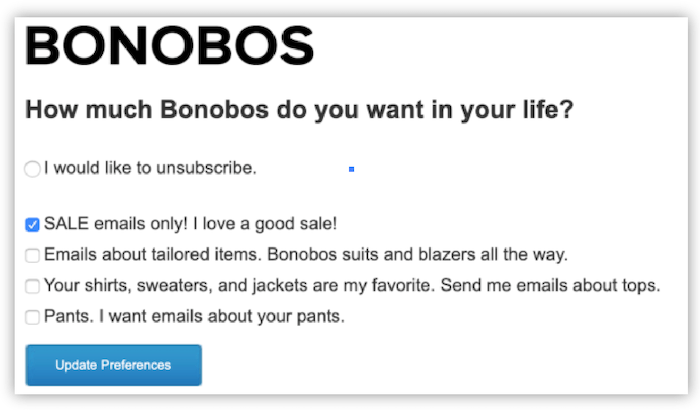
It could also be the case that they’d prefer a different method of communication instead, such as phone or SMS. For telephone communications, make sure you get an 800 business number to establish your credibility.
10. Practice the art of letting go
This is more of a psychological email marketing tip. Letting go of inactive subscribers is hard, even when you understand why it’s so important. Practicing the art of letting go will help you become more assertive in how you manage your email list, prioritizing quality and value over subscriber count. 100 engaged readers are better than 1000 disengaged readers.
Start cleaning out your email subscriber list today
On a physical level, decluttering your email marketing list is all about identifying and removing inactive and low-quality users. On a psychological level, it’s about reshaping your mindset. Remember, it doesn’t matter how many subscribers you have; if none of them are engaging, your email campaigns aren’t going to yield a return on your investment!
Email is one of our most powerful communication tools. Prioritizing quality over quantity doesn’t come naturally, but will result in a list of engaged, converting subscribers. Follow these tips to declutter you email list today:
- Identify hard bounce emails
- Delete duplicate emails
- Determine your inactive subscribers
- Use a proper list management software
- Visualize your ideal subscriber
- Provide an unsubscribe option for subscribers
- Get in touch with your inactive customers
- Locate inactive users and give them the option to opt-out
- Practice the art of letting go
About the author
Grace Lau is the Director of Growth Content at Dialpad, a contact center as a service solutions provider for better and easier team collaboration. She has over 10 years of experience in content writing and strategy. Currently, she is responsible for leading branded and editorial content strategies, partnering with SEO and Ops teams to build and nurture content. Here is her LinkedIn.
Source link



